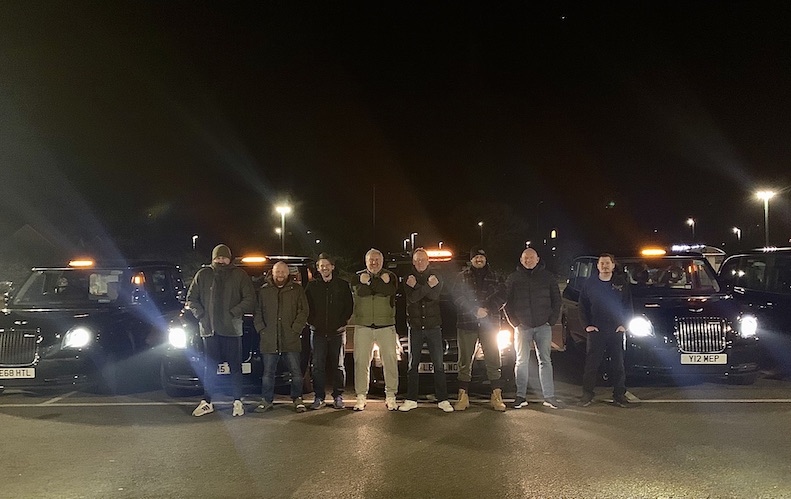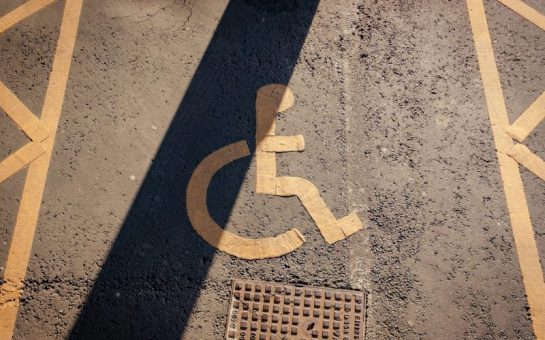A 70-year-old volunteer this week acted as translator for six London taxis transporting refugees from Poland after his wife said he was too old to do the trip.
Richard Szmidt, a British Pole from Morden, is an ex-volunteer at White Eagle Club, Balham who collected aid for the trip and convoyed 3,000 miles in 60 hours with the black cabbies from Harwich, Essex to Chelm, Poland.
Szmidt speaks English, French and Polish and has O-Level German and Russian, though he admits both are rusty having learned them 50 years ago.
On the way to Chelm, Szmidt rode in a black taxi with Richard Gough, 60, owner of Epsom taxi rental service Eclipse Rent-A-Taxi and on the way back he rode with another cabby, Ian, a seven-year-old girl, a 12-year-old boy, a mother, and a grandmother from east Ukraine.
In normal life Szmidt cares for his disabled wife but during the trip he left her with his two daughters who are nearly 30.
Westfall and Szmidt were both members of Aid Out, Refugees Back! Facebook group before Westfall reached out to Szmidt and brought him on as translator and facilitator.
Planning
Szmidt said: “I’m much better than Google Translate. I had to plan ahead to organise the who, what, when, where and how, and all the accreditation.”
He adopted an indispensable organisational role, speaking Polish with the refugee and aid centres to organise their check-in points before they arrived.
He informed them they would be taking refugees further afield as the group didn’t want to take refugees down the road to Warsaw.
The soldiers Szmidt spoke to were happy the taxis would take people further afield, telling him they put refugees on trains to Warsaw.
He learned they had to change their original destination from Dorahusk on the Ukrainian border to Chelm, a 27km drive west after The Ministry of Defence warned Szmidt of the Wagner Group’s, a private Kremlin-backed army, activity near the town and told him black cabs were too conspicuous.
He taught the cabbies to pronounce Chelm correctly, describing it as a particularly difficult challenge.
Delivering aid
One of the major challenges was sat-nav working poorly in Ukraine as the group got lost travelling to drop aid off at the Help Ukraine Center in Lublin on their way to Chelm.
Szmidt said: “The sat-nav took us to the road but the centre was nowhere to be seen.”
When picking up the cabs from the aid centre Szmidt said the soldiers said they had never seen inside a black cab before.
He praised Help Ukraine Center’s high turnover of aid, which was transported directly to Ukraine.
From their launch 1 March to 27 March the centre transported 3,059 tons of humanitarian aid, a daily average of 113 tons, according to their report.
Szmidt said they were often cheered along the motorways, but the hardest part was the distance travelled.
He added: “There was a lot of time spent staring at the road.”
Collecting the refugees
The Chelm refugee centre was a disused Tescos supermarket repurposed to temporarily house refugees and store aid.
Szmidt said the soldiers loved the cabbies.
His return taxi was quieter than Szmidt would have liked because the family only spoke Ukrainian and Russian, as they were from Dnipro in eastern Ukraine so didn’t know Polish.
Szmidt’s decades’-old O-Level was insufficient to hold extensive conversation, and they mainly slept.
The family had one hold-all and some plastic bags.
The Polish volunteers provided them with food but they ate very little.
Szmidt said: “It brings it home to you, how uprooted they are. That was their life they were carrying.”
He tried entertaining them with a Polish-Ukrainian song hoping they would join in, but they didn’t.
At one point there was laughter when the grandmother started snoring.
The family asked to be dropped off at Berlin Central Station but the cabbies paid out of their own pockets for an overnight hotel stay.
“They’re such big hearted blokes,” Szmidt said.
There were two other families in Berlin, four rooms were reserved.
Reflections
Szmidt said the taxi drivers were brilliant and accepted him as an outsider.
He said: “Let’s not forget these guys are self-employed. If they’re not cabbing they’re not earning. They’ve lost money.
“They’ve had a very tough couple of years with Covid. A lot of them weren’t working, some of them had to go and work for Waitrose.”
ITV reported the number of London taxi drivers fell to its lowest level in almost 40 years during the pandemic, with 5,000 fewer taxis in 2021 than 2020.
Szmidt would like to go again but has to care for his wife.
However he said else wants to go over Szmidt said he is always at the other end of the phone to help translate.
If he returns he would like to do some driving himself but would need a better car.





